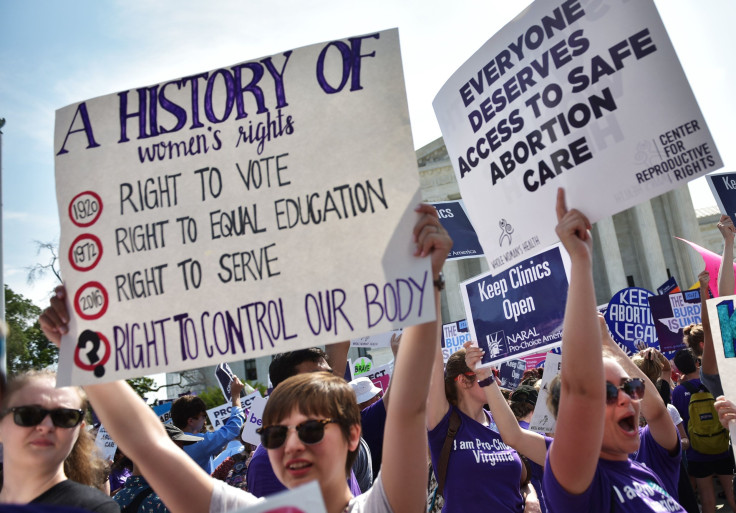Texas Abortion Law And 8 Of The Worst States For Women's Reproductive Rights, After SCOTUS Ruling

Attorneys general in more than a dozen states are examining provisions in abortion laws mandating that doctors have admitting privileges to hospitals and requiring clinics to meet ambulatory surgical center standards after the U.S. Supreme Court decision Monday that struck down similar provisions in Texas.
The court’s 5-3 ruling held that the Texas provisions placed an “undue burden” on women seeking access to abortion services. U.S. Attorney General Loretta E. Lynch promised in a statement Monday she would continue challenging laws that “unfairly restrict women’s rights” and “negatively impact women’s health.”
Here’s a look at eight states with regulations similar to those struck down in Texas.
Louisiana: Next door to Texas, Louisiana has similar requirements that doctors have admitting privileges to hospitals and that clinics meet outpatient surgical center standards, the New York Times reported. In March, the Supreme Court temporarily blocked a law putting admitting procedures for doctors on hold. Louisiana Attorney General Jeff Landry pledged Monday to continue to enforce the state’s “pro-life and pro-woman laws,” the Times-Picayune in New Orleans reported.
Mississippi: The Magnolia State passed requirements similar to those in Texas, but admitting procedures remain on hold. Philip Gunn, speaker of the state’s House of Representatives, reacted to the Supreme Court decision Monday by saying, “For those of us who believe in the sanctity of human life, this ruling is a major setback.” In Mississippi, women must get counseling and wait 24 hours before undergoing abortion procedures. They also are required to have ultrasounds before they can have abortions, according to the Guttmacher Institute, a policy and research organization focused on reproductive health and rights with offices in New York and Washington. Louisiana, Mississippi and Texas are all under the jurisdiction of the 5th U.S. Circuit Court of Appeals.
Oklahoma: Oklahoma has also passed requirements similar to those of Texas, but the admitting-privileges provision remains on hold. To have abortions there, women must first undergo counseling and then wait 24 hours. Oklahoma Gov. Mary Fallin vetoed a bill in May that would have made it a felony for a doctor to perform an abortion. The state’s first new abortion clinic in 30 years is set to open soon, BBC News reported.
Alabama: While admitting privileges remain on hold in Alabama, mandates that clinics meet ambulatory surgical center requirements have been in effect since 2013. A representative of Alabama’s attorney general said Monday the Supreme Court’s decision was under review, AL.com reported. As it stands now, women in the state must wait 48 hours after getting counseling before they can have abortions.
Wisconsin: As in Alabama, admitting privilege requirements are on hold in Wisconsin. The state law says women must get counseling and let a 24-hour waiting period pass before being able to receive abortions. Gov. Scott Walker told local media Monday he believed it would be difficult for the state’s law on admitting privileges to be upheld after the Supreme Court’s ruling.
Missouri: The Show Me State’s abortion regulations come close to mirroring those in Texas requiring doctors to have admitting privileges and clinics to meet outpatient surgical center standards. Missouri became the first state in 1986 to require clinics to meet ambulatory surgical center standards. A challenge to Missouri’s law would have to be filed for it to be struck down, the Associated Press reported. After getting counseling, women in Missouri must wait 72 hours in the event they want to receive abortions.
Kansas: Admitting privileges are on hold in Kansas where lawmakers in 2011 passed similar requirements to those struck down in Texas. Planned Parenthood of Kansas and Missouri said it would “swiftly form a legal plan to work to overturn both restrictions, in the state of Missouri and to ensure they never go into effect in Kansas,” the Topeka Capital-Journal reported. Kansas law currently mandates that women must wait 24 hours after receiving counseling to undergo abortion procedures. There are four clinics in the state that offer abortions, the AP reported.
Planned Parenthood of Kansas and mid-Missouri now exploring legal options to get rid of MO laws pic.twitter.com/gNkefDUAux
— Ariel Rothfield (@arothfield) June 27, 2016
North Dakota: The state has a mandate in effect that requires doctors performing abortions to have admitting privileges. It spent more than $491,000 attempting to defend a law that tried to ban abortions when fetal heartbeats were detected, the AP reported. The state has one abortion clinic, located in the city of Fargo, and the director of the clinic said it would analyze the Supreme Court’s decision to see whether there is anything that can be done to reverse state law. Women seeking abortions must observe 24-hour waiting periods in North Dakota.

© Copyright IBTimes 2025. All rights reserved.






















